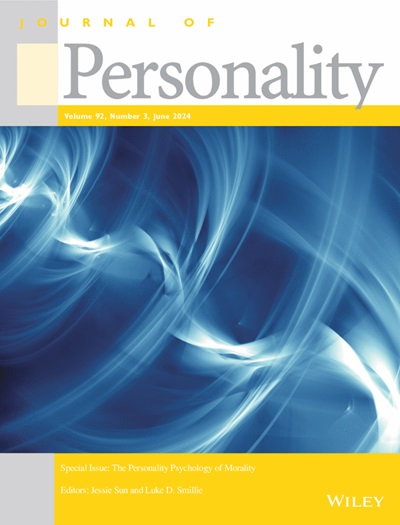The Relations Among Prosocial Behavior, Life Satisfaction, and Hedonic Balance Among Young Adults.
IF 2.7
1区 心理学
Q1 Psychology
引用次数: 0
Abstract
OBJECTIVE This study examined the intra-individual associations between prosocial behavior and two dimensions of subjective well-being-life satisfaction and hedonic balance-in the daily lives of young adults. METHOD Two samples of Italian and Spanish participants aged 18-35 completed self-report measures at different intervals: a daily sample assessed for ten consecutive days (N = 388; 76% women) and a weekly sample assessed for five consecutive weeks (N = 260; 80.3% women). The weekly interval was included as a "sensitivity analysis" to evaluate the stability of effects over longer periods. We employed Random Intercept Cross-Lagged Panel Models (RI-CLPMs) to investigate within-person dynamics while accounting for stable between-person differences. RESULTS In the daily sample, prosocial behavior was associated with increases in life satisfaction from one day to the next one. This effect was not observed across weekly assessments. Although we did not find any empirical evidence that prosocial behavior affects hedonic balance, within-person correlations between variables were observed in the daily sample, but these tended to disappear in the weekly period. CONCLUSIONS Incorporating prosocial behaviors into daily routines may promote young adults' life satisfaction. This study contributes to the growing knowledge on how prosocial behavior influences subjective well-being in everyday life.青年亲社会行为、生活满意度与享乐平衡的关系
目的探讨青年日常生活中亲社会行为与主观幸福感两个维度——生活满意度和享乐平衡之间的个体内关系。方法两组年龄在18-35岁的意大利和西班牙参与者在不同的时间间隔完成自我报告测量:连续10天每天评估一次样本(N = 388;76%的女性)和连续5周的每周样本评估(N = 260;80.3%的女性)。每周间隔被纳入“敏感性分析”,以评估较长时间内效果的稳定性。我们采用随机截距交叉滞后面板模型(ri - clpm)来研究人内部动态,同时考虑稳定的人与人之间的差异。结果在日常样本中,亲社会行为与每天的生活满意度增加有关。在每周评估中没有观察到这种效果。虽然我们没有发现亲社会行为影响享乐平衡的任何经验证据,但在日常样本中观察到人与人之间的相关性,但这些相关性在每周周期中趋于消失。结论将亲社会行为融入日常生活中可以提高青少年的生活满意度。本研究有助于了解亲社会行为如何影响日常生活中的主观幸福感。
本文章由计算机程序翻译,如有差异,请以英文原文为准。
求助全文
约1分钟内获得全文
求助全文
来源期刊

Journal of Personality
PSYCHOLOGY, SOCIAL-
CiteScore
9.60
自引率
6.00%
发文量
100
期刊介绍:
Journal of Personality publishes scientific investigations in the field of personality. It focuses particularly on personality and behavior dynamics, personality development, and individual differences in the cognitive, affective, and interpersonal domains. The journal reflects and stimulates interest in the growth of new theoretical and methodological approaches in personality psychology.
 求助内容:
求助内容: 应助结果提醒方式:
应助结果提醒方式:


